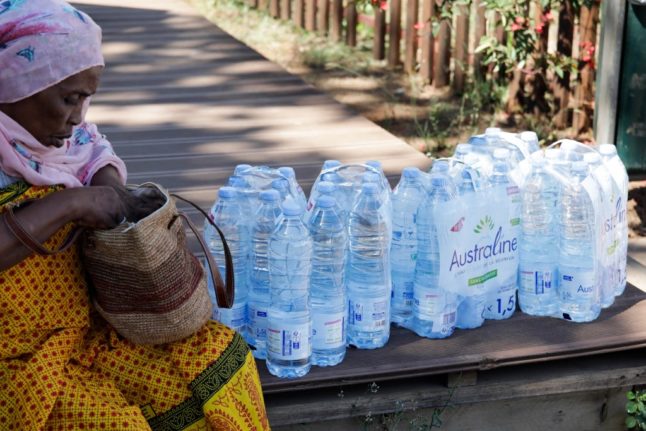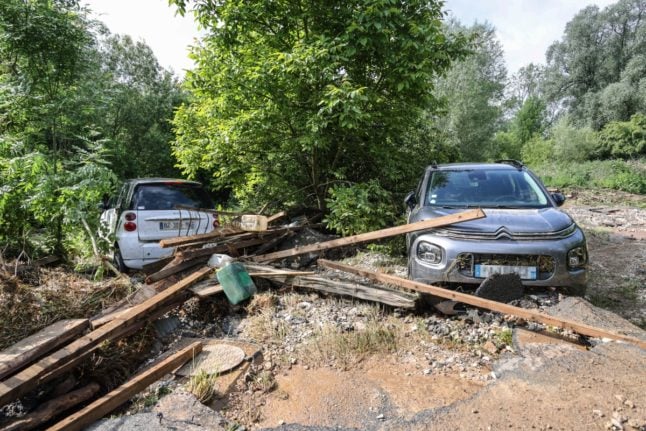Although Mayotte’s people and representatives have pushed for help from Paris, they have been left disappointed by a piecemeal government reaction.
“People are furious, but exhausted,” Estelle Youssouffa, one of the archipelago’s two MPs in the Paris parliament, told AFP.
“Their only obsession is finding water, getting organised to go and buy it, walking for kilometres to an area with water to have a shower, thinking about old people or the sick who can’t get water for themselves. You think about it all day.”
Sitting north of Madagascar, over 8,000 kilometres (5,000 miles) from the capital, the territory’s 300,000 people may soon face longer water cuts, Mayotte’s prefect Thierry Suquet said Wednesday.
Supply is largely dependent on rainfall and the longest drought since 1997 has left reservoirs close to dry.
Without new cuts, “by the end of October we’ll find ourselves with between 15,000 and 20,000 cubic metres” available per day, Suquet said — less than half the population’s estimated needs.
READ ALSO: 40,000 people in France still without drinking water amid drought
People have been told to boil what water there is before use even though authorities insist it is fit for consumption.
“We want drinkable water for the whole population,” said Racha Mouzdikoudine, a demonstrator at a protest earlier this month, brandishing a bottle of brownish liquid she said came from her tap.
“This isn’t normal, I can’t even give this water to my cat”.
‘Enormous distress’
Children are being sent home from dry schools and hospitals are seeing increasing numbers of people falling sick.
By late August, “ten or so people were arriving every day with digestive problems, vomiting, diarrhoea and dehydration,” Jonathan Cambriels, a nurse at the Petit-Terre hospital, told AFP earlier this month.
Mayotte also has a shortage of medical personnel, with just 86 doctors for every 100,000 people in 2021 — one-quarter the ratio in mainland France.
“I sensed enormous distress among the medical staff,” Philippe Vigier, junior minister for France’s overseas territories, said during a brief visit this week.
At the National Assembly in Paris on Tuesday, he told MP Youssouffa that the government had set up additional water pipes to improve distribution, installed water tanks in schools, and was distributing 5.4 million bottles of water to 50,000 “vulnerable” inhabitants.
Paris has also committed 35 million euros ($37 million) to plugging leaks in the water system, and says two long-promised desalination plants would be completed by the end of 2024.
This is not enough, Youssouffa told AFP.
“Why aren’t we declared in a state of natural disaster, just like any time there’s a drop of rain and a storm in a village in Dordogne (in western France)?” she asked.
“The people I’m speaking to in Paris don’t know three-quarters of what’s going on” in Mayotte, she said, accusing local authorities of having failed to inform their superiors.
Youssouffa argues that the authorities should be distributing water for free to all of Mayotte’s people — almost 80 percent of whom lived below the poverty line in 2018, according to statistics authority Insee.
Water should be delivered by direct military shipments rather than slow commercial voyages, she added, while the bills people continue to receive from the water company for dirty or non-existent supply should be cancelled.
The official pauses may be for two days in three, but “I haven’t had any water in the house for seven days,” Mayotte resident Anfedine told AFP this month, fiddling uselessly with the tap in her shower.
Over the longer term, Youssouffa called for a cistern in every house and renovation and cleaning of the water system, including construction of a new reservoir.
“We can take advantage of the water crisis to do the work needed for the immediate future,” she said.
As for the promised desalination plants,” I’m like Saint Thomas, I only believe in what I can see. I’ll say thank you when there’s more water in my tap,” Youssouffa added.
‘That’s the end’
This year’s shift in the south Pacific from the El Nino weather phenomenon to La Nina could be bad news for Mayotte, which should normally enter its rainy season in December.
Weather authority Meteo France this month predicted “a shortfall in precipitation across the island” through the end of the year, in part due to La Nina.
At the same time, Mayotte also faces demographic pressure through irregular migration from the neighbouring Comoros islands.
Earlier this summer, the government launched a huge operation to raze shanty towns and clamp down on crime. The Comoros government agreed to take back voluntary returnees.
The step was “very, very important… to put a stop to the idea that there’s nothing to be done with Mayotte” in Paris, Youssouffa said, citing demonstrations in favour of the operation by locals.
But where people have found the energy to demonstrate more recently, it has been to demand solutions to the water crisis.
“If it doesn’t rain, that’s the end,” said Sylvain Amavi, a member of the Mayotte 2018 collective, at a Wednesday demonstration timed with minister Vigier’s visit.
“The state isn’t planning anything. We have no idea what the future will be like.”



 Please whitelist us to continue reading.
Please whitelist us to continue reading.
Member comments